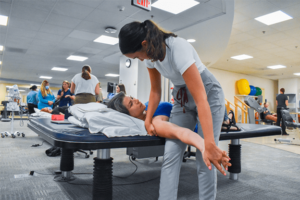
Pursuing a Doctor of Physical Therapy (DPT) degree is a rewarding path that leads to a fulfilling career in healthcare. However, the journey to becoming a physical therapist requires dedication, preparation, and strategic planning. Whether you’re finishing your undergraduate degree or transitioning from another field, the following tips can help you prepare for a successful entry into a DPT program.
1. Understand the Admission Requirements
DPT programs typically have specific prerequisites that must be completed before applying. These often include courses in anatomy, biology, chemistry, physics, and psychology. Research your target programs early to ensure you meet these requirements. A strong GPA, usually 3.0 or higher, is essential, as is a competitive GRE score if required. Additionally, many programs expect letters of recommendation and documented clinical experience in physical therapy settings.
2. Gain Relevant Experience
Hands-on experience is invaluable for building your understanding of the field and strengthening your application. Shadow licensed physical therapists in different settings, such as outpatient clinics, hospitals, or sports facilities. Volunteer opportunities at rehabilitation centers or nursing homes can also provide insight into the profession. Aim to accumulate a diverse range of experiences to showcase your commitment and versatility.
3. Build a Strong Academic Foundation
Success in a DPT program requires a solid academic foundation, especially in science-based coursework. Focus on excelling in prerequisite subjects and consider taking advanced courses to deepen your knowledge. Joining study groups, utilizing tutoring resources, and maintaining consistent study habits can help you stay on top of your academics.
4. Develop Strong Communication Skills
Physical therapists interact with patients, families, and healthcare teams daily. Strong interpersonal and communication skills are critical for building trust and ensuring effective treatment. Participate in activities that enhance your ability to communicate, such as public speaking clubs or leadership roles in campus organizations.
5. Research and Select the Right Program
Choosing the right Doctor of Physical Therapy program is crucial for your success. Consider factors such as accreditation by the Commission on Accreditation in Physical Therapy Education (CAPTE), program location, tuition, class size, and clinical opportunities. Attend open houses, speak with current students or alumni, and explore online resources to gather insights about potential programs.
6. Strengthen Your Application Materials
A compelling application can set you apart from other candidates. Write a personal statement that reflects your passion for physical therapy and highlights your unique experiences. Secure strong letters of recommendation from professors, employers, or physical therapists who know your abilities well. Tailor your application to align with each program’s values and goals.
7. Take Care of Your Physical and Mental Health
DPT programs are rigorous, requiring physical stamina and mental resilience. Adopt healthy habits such as regular exercise, balanced nutrition, and effective stress management techniques. Building a support network of mentors, peers, and family members can also provide encouragement during challenging times.
8. Stay Informed About the Field
Stay up to date with advancements in physical therapy by reading industry publications and attending webinars or workshops. Joining professional organizations like the American Physical Therapy Association (APTA) can provide access to valuable resources and networking opportunities.
9. Build Time-Management Skills
Balancing coursework, clinical rotations, and personal responsibilities requires excellent time-management skills. Use planners or digital tools to organize tasks, set priorities, and establish a productive routine. Practicing these skills before entering a DPT program can help you transition smoothly.
Conclusion
Preparing for a DPT program is a multifaceted process that involves academic readiness, practical experience, and personal growth. By starting early, staying organized, and remaining committed to your goals, you’ll set yourself up for success in both your education and your future career as a physical therapist.







